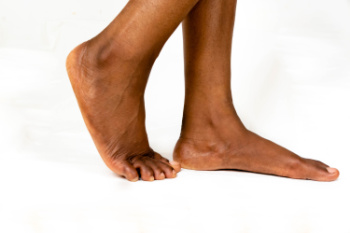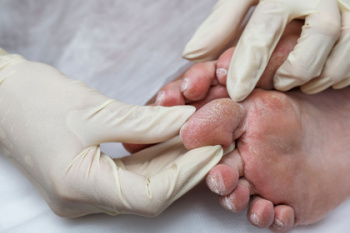Items filtered by date: May 2024
Treatment for Flat Foot
 Flat foot, which occurs when the foot's arch collapses, can lead to discomfort and pain, particularly in the heel or arch area. This condition may also affect overall foot function. To manage and treat flat feet, a podiatrist might recommend several supportive therapies depending on the severity of the condition and the specific needs of the patient. One common treatment is the use of arch support insoles, which are inserts for the shoes. These insoles help to distribute pressure more evenly across the foot, provide stability, and relieve strain on the arch and surrounding muscles. For cases where insoles alone are not sufficient, a podiatrist may also suggest additional support through structured shoes with built-in arch support, ankle braces, or foot orthotics. Severe cases may require corrective exercises or even surgery to realign the foot and restore function. Regular monitoring and adjustments by a podiatrist are important to effectively manage flat foot and prevent further complications. If you have a flat foot, it is suggested that you make an appointment with a podiatrist.
Flat foot, which occurs when the foot's arch collapses, can lead to discomfort and pain, particularly in the heel or arch area. This condition may also affect overall foot function. To manage and treat flat feet, a podiatrist might recommend several supportive therapies depending on the severity of the condition and the specific needs of the patient. One common treatment is the use of arch support insoles, which are inserts for the shoes. These insoles help to distribute pressure more evenly across the foot, provide stability, and relieve strain on the arch and surrounding muscles. For cases where insoles alone are not sufficient, a podiatrist may also suggest additional support through structured shoes with built-in arch support, ankle braces, or foot orthotics. Severe cases may require corrective exercises or even surgery to realign the foot and restore function. Regular monitoring and adjustments by a podiatrist are important to effectively manage flat foot and prevent further complications. If you have a flat foot, it is suggested that you make an appointment with a podiatrist.
Flatfoot is a condition many people suffer from. If you have flat feet, contact Wendy K. Stinson, DPM from New Jersey. Our doctor will treat your foot and ankle needs.
What Are Flat Feet?
Flatfoot is a condition in which the arch of the foot is depressed and the sole of the foot is almost completely in contact with the ground. About 20-30% of the population generally has flat feet because their arches never formed during growth.
Conditions & Problems:
Having flat feet makes it difficult to run or walk because of the stress placed on the ankles.
Alignment – The general alignment of your legs can be disrupted, because the ankles move inward which can cause major discomfort.
Knees – If you have complications with your knees, flat feet can be a contributor to arthritis in that area.
Symptoms
- Pain around the heel or arch area
- Trouble standing on the tip toe
- Swelling around the inside of the ankle
- Flat look to one or both feet
- Having your shoes feel uneven when worn
Treatment
If you are experiencing pain and stress on the foot you may weaken the posterior tibial tendon, which runs around the inside of the ankle.
If you have any questions please feel free to contact our office located in Parsippany-Troy Hills, NJ . We offer the newest diagnostic and treatment technologies for all your foot and ankle needs.
How Diabetic Patients Should Care for Their Feet

For people who have diabetes, foot care is not just a matter of comfort, it is imperative for preventing serious complications. High blood sugar levels can lead to nerve damage and poor circulation, increasing the risk of foot problems. Diabetic patients should inspect their feet daily for cuts, blisters, or signs of infection, and keep them clean and moisturized to prevent dryness and cracking. Wearing properly fitted shoes and socks is essential to prevent friction and pressure points. Regular appointments with a podiatrist are so important for diabetic foot care. Podiatrists can conduct comprehensive foot exams, assess nerve function and blood flow, and provide guidance on proper footwear and foot hygiene. They can also address any issues promptly, reducing the risk of complications such as diabetic ulcers or infections. If you have diabetes, it is strongly suggested that you schedule regular appointments with a podiatrist to safeguard your well-being and maintain mobility and comfort for years to come.
Diabetic foot care is important in preventing foot ailments such as ulcers. If you are suffering from diabetes or have any other concerns about your feet, contact Wendy K. Stinson, DPM from New Jersey. Our doctor can provide the care you need to keep you pain-free and on your feet.
Diabetic Foot Care
Diabetes affects millions of people every year. The condition can damage blood vessels in many parts of the body, especially the feet. Because of this, taking care of your feet is essential if you have diabetes, and having a podiatrist help monitor your foot health is highly recommended.
The Importance of Caring for Your Feet
- Routinely inspect your feet for bruises or sores.
- Wear socks that fit your feet comfortably.
- Wear comfortable shoes that provide adequate support.
Patients with diabetes should have their doctor monitor their blood levels, as blood sugar levels play such a huge role in diabetic care. Monitoring these levels on a regular basis is highly advised.
It is always best to inform your healthcare professional of any concerns you may have regarding your feet, especially for diabetic patients. Early treatment and routine foot examinations are keys to maintaining proper health, especially because severe complications can arise if proper treatment is not applied.
If you have any questions please feel free to contact our office located in Parsippany-Troy Hills, NJ . We offer the newest diagnostic and treatment technologies for all your foot and ankle needs.
The Realities of Heel Spur Surgery

Heel spur surgery stands as a significant decision for those grappling with persistent heel pain. The surgery involves excising the bony protrusion from the heel bone, often performed under local or general anesthesia. It typically necessitates a recovery period during which mobility may be limited, demanding patience and adherence to post-operative instructions. Complications such as infection or nerve damage, though rare, underscore the importance of meticulous post-operative care. The decision to undergo surgery hinges on various factors, including the severity of symptoms and the efficacy of non-surgical interventions. Consulting with a podiatrist is essential for informed decision-making, as they can provide tailored guidance based on individual circumstances. While heel spur surgery offers relief for many, it is important to approach it with a thorough understanding of the process, potential outcomes, and commitment to recovery. If you have a heel spur that is causing pain, it is strongly suggested that you confer with a podiatrist who can determine if heel spur surgery is right for you.
Foot surgery is sometimes necessary to treat a foot ailment. To learn more, contact Wendy K. Stinson, DPM of New Jersey. Our doctor will assist you with all of your foot and ankle needs.
When Is Surgery Necessary?
Foot and ankle surgery is generally reserved for cases in which less invasive, conservative procedures have failed to alleviate the problem. Some of the cases in which surgery may be necessary include:
- Removing foot deformities like bunions and bone spurs
- Severe arthritis that has caused bone issues
- Cosmetic reconstruction
What Types of Surgery Are There?
The type of surgery you receive will depend on the nature of the problem you have. Some of the possible surgeries include:
- Bunionectomy for painful bunions
- Surgical fusion for realignment of bones
- Neuropathy decompression surgery to treat nerve damage
Benefits of Surgery
Although surgery is usually a last resort, it can provide more complete pain relief compared to non-surgical methods and may allow you to finally resume full activity.
Surgical techniques have also become increasingly sophisticated. Techniques like endoscopic surgery allow for smaller incisions and faster recovery times.
If you have any questions please feel free to contact our office located in Parsippany-Troy Hills, NJ . We offer the newest diagnostic and treatment technologies for all your foot and ankle needs.
Diagnosis and Treatment for Congenital Foot Abnormalities

Congenital abnormalities of the feet encompass a variety of conditions present at birth, including clubfoot, rocker deformity, flatfoot, metatarsus varus, and pes cavus. Clubfoot involves the inward twisting of the foot, while rocker deformity presents as a prominent midfoot bump. Flatfoot refers to a collapsed arch, metatarsus varus to inward forefoot curvature, and pes cavus to an exaggerated arch. Radiographic images are essential in diagnosing and monitoring these conditions, providing detailed insights into bone alignment and structure. Treatment options vary depending on severity and type and may include bracing, stretching exercises, or, in some cases, surgical intervention. A podiatrist specializes in addressing congenital foot abnormalities, offering expert guidance, personalized treatment plans, and ongoing care to ensure optimal foot health. If you have a child born with a congenital foot problem, it is strongly suggested that you schedule an appointment with a podiatrist as quickly as possible for a proper diagnosis and treatment.
Congenital foot problems require immediate attention to avoid future complications. If you have any concerns, contact Wendy K. Stinson, DPM of New Jersey. Our doctor can provide the care you need to keep you pain-free and on your feet.
Congenital foot problems are deformities affecting the feet, toes, and/or ankles that children are born with. Some of these conditions have a genetic cause while others just happen. Some specific foot ailments that children may be born with include clubfeet, polydactyly/macrodactyly, and cleft foot. There are several other foot anomalies that can occur congenitally. What all of these conditions have in common is that a child may experience difficulty walking or performing everyday activities, as well as trouble finding footwear that fits their foot deformity. Some of these conditions are more serious than others. Consulting with a podiatrist as early as possible will help in properly diagnosing a child’s foot condition while getting the necessary treatment underway.
What are Causes of Congenital Foot Problem?
A congenital foot problem is one that happens to a child at birth. These conditions can be caused by a genetic predisposition, developmental or positional abnormalities during gestation, or with no known cause.
What are Symptoms of Congenital Foot Problems?
Symptoms vary by the congenital condition. Symptoms may consist of the following:
- Clubfoot, where tendons are shortened, bones are shaped differently, and the Achilles tendon is tight, causing the foot to point in and down. It is also possible for the soles of the feet to face each other.
- Polydactyly, which usually consists of a nubbin or small lump of tissue without a bone, a toe that is partially formed but has no joints, or an extra toe.
- Vertical talus, where the talus bone forms in the wrong position causing other bones in the foot to line up improperly, the front of the foot to point up, and the bottom of the foot to stiffen, with no arch, and to curve out.
- Tarsal coalition, when there is an abnormal connection of two or more bones in the foot leading to severe, rigid flatfoot.
- Cleft foot, where there are missing toes, a V-shaped cleft, and other anatomical differences.
- Macrodactyly, when the toes are abnormally large due to overgrowth of the underlying bone or soft tissue.
Treatment and Prevention
While there is nothing one can do to prevent congenital foot problems, raising awareness and receiving neonatal screenings are important. Early detection by taking your child to a podiatrist leads to the best outcome possible.
If you have any questions, please feel free to contact our office located in Parsippany-Troy Hills, NJ . We offer the newest diagnostic and treatment technologies for all your foot care needs.
